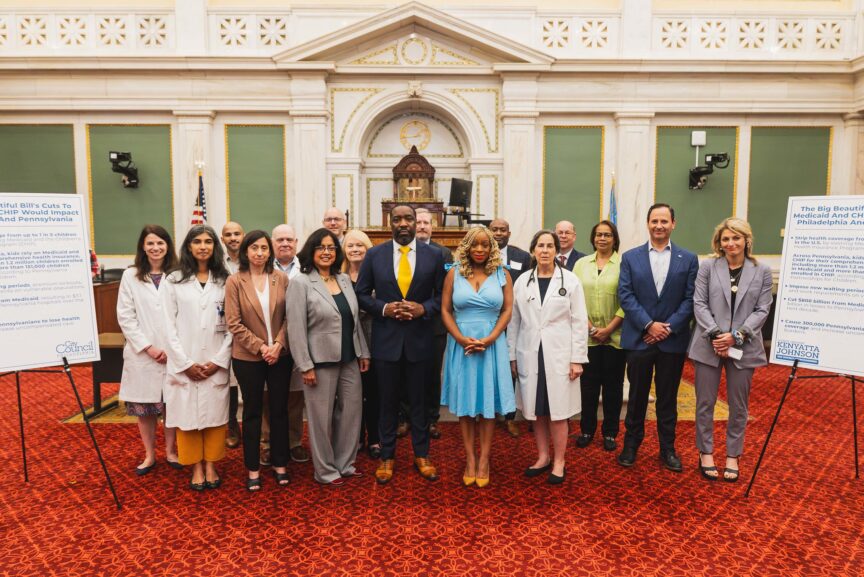Friday, June 27, 2025
Passage of the bill would have devastating impacts to people on Medicaid and The Children’s Health Insurance Program (CHIP) in Philadelphia
Philadelphia City Council President Kenyatta Johnson (Second District) and Councilmembers Dr. Nina Ahmad (At-Large), Chair of Council’s Public Health and Human Services Committee, and Jamie Gauthier (3rd District), Rue Landau (At-Large) and Quetcy Lozada (7th District) stood in City Council Chambers with key leaders in health care, public policy, and community advocacy to denounce The One Big Beautiful Bill Act (OBBBA) that is being considered by the U.S. Senate.
The U.S. House approved the bill on May 22. The U.S. Senate is expected to take a final vote on the bill before the July 4 holiday.
If approved, President Donald Trump’s tax bill includes devastating impacts of proposed Medicaid cuts to not only Philadelphia but the entire country. Medicaid is a public health insurance program for individuals or families with limited incomes and resources, including children, pregnant women, older adults, and people with disabilities. People who receive Medicaid have most – if not all – their healthcare services paid for by federal, state, and local governments.
Approval of OBBBA would mean billions of dollars in cuts that could strip people of basic services including striping health insurance and care from almost 15 million Americans, the biggest cut to healthcare in American history.
The legislation would also do the following:
- Strip health coverage from up to 1 in 5 children in the U.S. by slashing Medicaid and the Children’s Health Insurance Program (CHIP). Across Pennsylvania, more than 1.2 million children who are enrolled in Medicaid and more than 151,000 children who are enrolled in CHIP rely on both for their comprehensive health insurance, according to Pennsylvania Partnerships for Children.
- Impose new waiting periods, premium lockouts, and work requirements on vulnerable populations.
- Cut $800 billion from Medicaid, resulting in $7.1 billion in losses to Pennsylvania hospitals over the next decade.
- Cause 300,000 Pennsylvanians to lose health coverage and increase uncompensated care burdens.
“The OBBBA would have a devastating impact on Philadelphia and Pennsylvania by leaving our most vulnerable residents at risk,” Council President Johnson said. “I stand united with our healthcare workers and hospital leaders in protecting the well-being of our most vulnerable neighbors. It is sweeping overreach that puts politics over people.”
“Let’s not mince words—these cruel Medicaid cuts are about one thing: paying for $4.5 trillion in tax breaks for the ultra-wealthy and giant corporations by extending the disastrous 2017 Tax Cuts and Jobs Act,” said Councilmember Dr. Nina Ahmad (At-Large). “We cannot close our eyes to what this means: children without care, disabled people abandoned, pregnant people left without support, and elders in nursing homes forced to fend for themselves. Medicaid is not a line item—it is the backbone of our healthcare system. Without it, our hospitals and clinics will crumble, and lives will be lost.”
“The Trump Administration and its billionaire backers want to slash Medicaid and other essential services families rely on to pay for massive tax cuts for billionaires and corporations,” Councilmember Gauthier said. “The bottom line is that Republicans care more about handouts for their ultra-wealthy donors than they do about the people who will suffer because of their cruel cuts.”
In recent weeks, Councilmember Gauthier led an effort for Councilmembers to sign a letter that was sent to the Pennsylvania U.S. Senators Dave McCormick and John Fetterman asking them to reject funding cuts to Medicaid because of the impact they would have on Philadelphia’s mental health infrastructure. The letter was signed by Councilmembers Gauthier, Ahmad, Landau (At-Large), Nicolas O’Rourke (At-Large), Kendra Brooks (At-Large), Dr. Anthony Phillips (9th District) and Mark Squilla (1st District).
According to the letter, more than one in four Philadelphians rely on Medicaid for healthcare and Medicaid is the largest payer of behavioral health services, investing $52 billion annually nationwide. In Philadelphia, Community Behavioral Health (CBH), funded by Medicaid, served over 100,000 residents in 2022, spending over $860 million on treatment.
The opioid epidemic continues to have a devastating impact in Philadelphia, claiming 1,315 lives in 2023, the second highest on record. This crisis disproportionately affects communities of color, with overdose fatalities rising among African American and Hispanic residents.
Medicaid covers nearly half of all addiction treatments in Philadelphia and any reduction in funding will directly dismantle the City’s vital substance abuse treatment infrastructure, leading to a possible surge in overdoses, a reversal of progress, and the loss of more lives.
Everyone attending the press conference urged all citizens to contact every U.S. House and Senate member nationwide to vote against the OBBBA.
Also speaking at the press conference was Dr. Cheryl Bettigole, MD, MPH, Professor, Clinical Family Medicine & Community Health, Perelman School of Medicine, University of Pennsylvania (former City of Philadelphia Health Commissioner 2021-2024); Claire Aiminde, Chief Nursing Officer, St. Christopher’s Hospital for Children; Julie Platt, Director, Advocacy and External Affairs, Mental Health Partnerships; and Peter Grollman, Senior Vice President, External Affairs, for Children’s Hospital of Philadelphia.
Representatives from Children’s Hospital of Philadelphia (CHOP), Temple Health, Wills Eye Hospital, Drexel University and Jefferson Health also attended.


